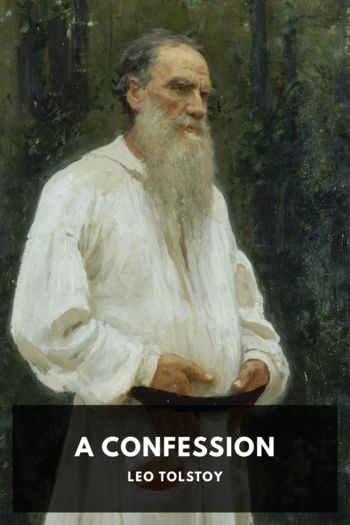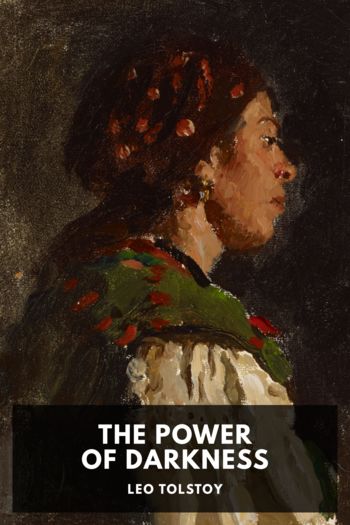Resurrection by Leo Tolstoy (best sci fi novels of all time TXT) 📕

- Author: Leo Tolstoy
Book online «Resurrection by Leo Tolstoy (best sci fi novels of all time TXT) 📕». Author Leo Tolstoy
“Good gracious, will this never come to an end!” the convoy officer, a tall, fat, red-faced man with high shoulders, who kept puffing the smoke, of his cigarette into his thick moustache, asked, as he drew in a long puff. “You are killing me. From where have you got them all? Are there many more?” the clerk inquired.
“Twenty-four men and the women.”
“What are you standing there for? Come on,” shouted the convoy officer to the prisoners who had not yet passed the revision, and who stood crowded one behind the other. The prisoners had been standing there more than three hours, packed in rows in the full sunlight, waiting their turns.
While this was going on in the prison yard, outside the gate, besides the sentinel who stood there as usual with a gun, were drawn up about twenty carts, to carry the luggage of the prisoners and such prisoners as were too weak to walk, and a group of relatives and friends waiting to see the prisoners as they came out and to exchange a few words if a chance presented itself and to give them a few things. Nekhlúdoff took his place among the group. He had stood there about an hour when the clanking of chains, the noise of footsteps, authoritative voices, the sound of coughing, and the low murmur of a large crowd became audible.
This continued for about five minutes, during which several jailers went in and out of the gateway. At last the word of command was given. The gate opened with a thundering noise, the clattering of the chains became louder, and the convoy soldiers, dressed in white blouses and carrying guns, came out into the street and took their places in a large, exact circle in front of the gate; this was evidently a usual, often-practised manoeuvre. Then another command was given, and the prisoners began coming out in couples, with flat, pancake-shaped caps on their shaved heads and sacks over their shoulders, dragging their chained legs and swinging one arm, while the other held up a sack.
First came the men condemned to hard labour, all dressed alike in grey trousers and cloaks with marks on the back. All of them—young and old, thin and fat, pale and red, dark and bearded and beardless, Russians, Tartars, and Jews—came out, clattering with their chains and briskly swinging their arms as if prepared to go a long distance, but stopped after having taken ten steps, and obediently took their places behind each other, four abreast. Then without interval streamed out more shaved men, dressed in the same manner but with chains only on their legs. These were condemned to exile. They came out as briskly and stopped as suddenly, taking their places four in a row. Then came those exiled by their Communes. Then the women in the same order, first those condemned to hard labour, with grey cloaks and kerchiefs; then the exiled women, and those following their husbands of their own free will, dressed in their own town or village clothing. Some of the women were carrying babies wrapped in the fronts of their grey cloaks.
With the women came the children, boys and girls, who, like colts in a herd of horses, pressed in among the prisoners.
The men took their places silently, only coughing now and then, or making short remarks.
The women talked without intermission. Nekhlúdoff thought he saw Máslova as they were coming out, but she was at once lost in the large crowd, and he could only see grey creatures, seemingly devoid of all that was human, or at any rate of all that was womanly, with sacks on their backs and children round them, taking their places behind the men.
Though all the prisoners had been counted inside the prison walls, the convoy counted them again, comparing the numbers with the list. This took very long, especially as some of the prisoners moved and changed places, which confused the convoy.
The convoy soldiers shouted and pushed the prisoners (who complied obediently, but angrily) and counted them over again. When all had been counted, the convoy officer gave a command, and the crowd became agitated. The weak men and women and children rushed, racing each other, towards the carts, and began placing their bags on the carts and climbing up themselves. Women with crying babies, merry children quarrelling for places, and dull, careworn prisoners got into the carts.
Several of the prisoners took off their caps and came up to the convoy officer with some request. Nekhlúdoff found out later that they were asking for places on the carts. Nekhlúdoff saw how the officer, without looking at the prisoners, drew in a whiff from his cigarette, and then suddenly waved his short arm in front of one of the prisoners, who quickly drew his shaved head back between his shoulders as if afraid of a blow, and sprang back.
“I will give you a lift such that you’ll remember. You’ll get there on foot right enough,” shouted the officer. Only one of the men was granted his request—an old man with chains on his legs; and Nekhlúdoff saw the old man take off his pancake-shaped cap, and go up to the cart crossing himself. He could not manage to get up on the cart because of the chains that prevented his lifting his





Comments (0)